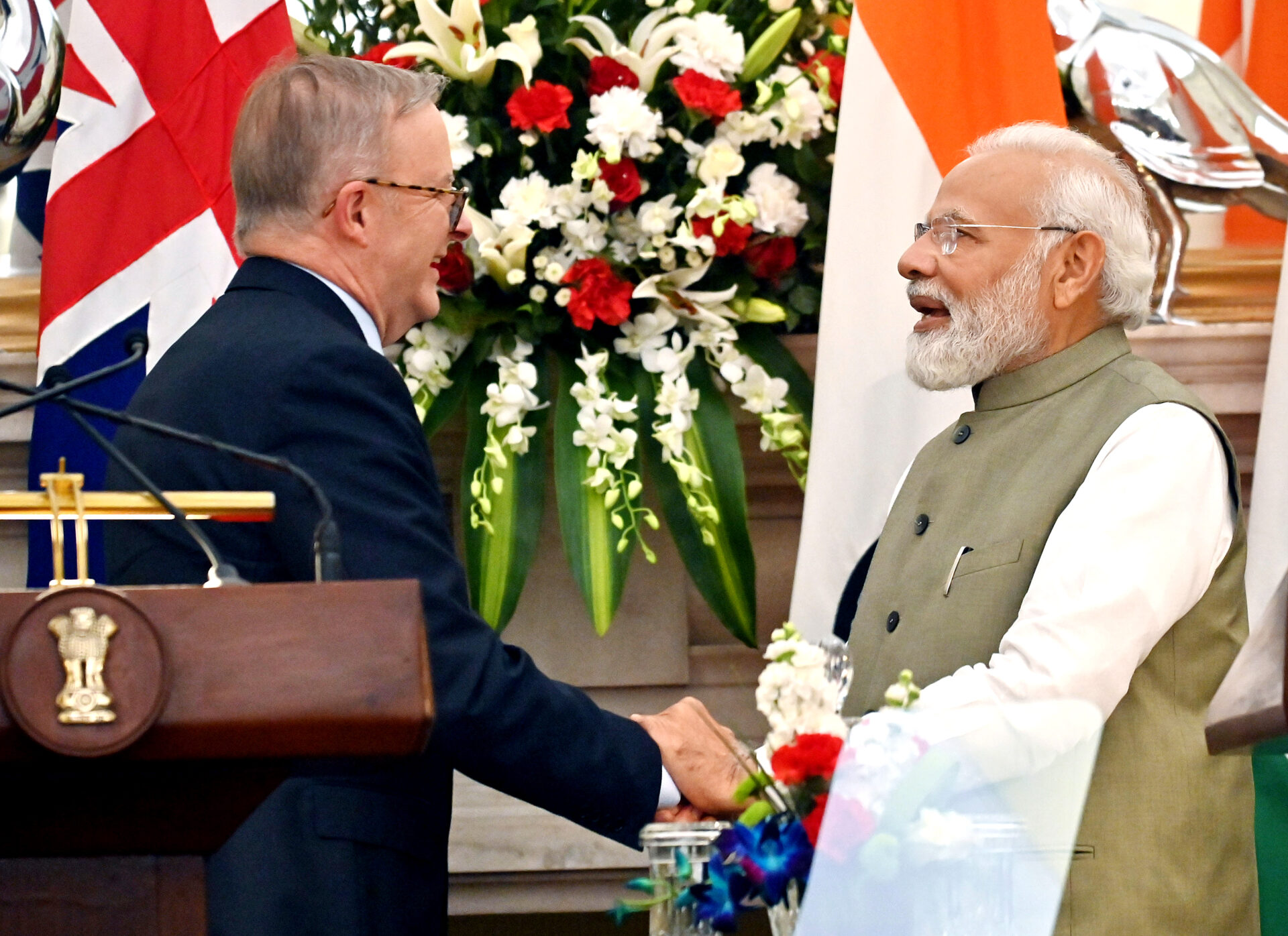The buzz about the Modi visit in Sydney is getting louder as Indian-Australians book charter buses and a ‘Modi Airways’ plane to soak in this people’s carnival.
The splash of Holi colours in India will still be fresh in Australian Prime Minister Anthony Albanese’s memory as he prepares to host his Indian counterpart Narendra Modi in Sydney, home to a vibrant Indian diaspora.
More than two months ago, Mr Albanese was in India, playing Holi, and interacting with students at IIT Delhi. Weeks later, Mr Modi will be in Sydney, pushing the envelope for this multi-faceted partnership which has undergone dramatic transformation in the last decade.
Prime Minister Modi’s decision to continue with his visit to Australia after Canberra’s last-minute cancellation of the Quad summit in Sydney showcases his deep personal commitment to take the India-Australia partnership to the next level. US President Joe Biden had made his choice—he can’t allow America’s image to be sullied due to a debt default by the world’s largest economy, all because of a Quad summit. PM Modi, on his part, has also made his choice. By continuing with his outreach to Papua New Guinea and Australia with a bilateral visit, PM Modi has signalled a new “Look Pacific” policy against the backdrop of China’s growing preponderance in the strategically located region. With the Quad summit now shifted to Hiroshima, India-Australia relations will now be centerstage in one of the world’s most livable cities.
WHY MODI’S VISIT MATTERS
Optics apart, why is PMModi’s visit to Australia so important? There are many potent reasons for the deepening India-Australia connect. First and foremost, there is a greater strategic convergence of interests and mutual political commitment to chart new avenues in this relationship. Albanese was quick to invite PM Modi to Sydney minutes after the Quad summit was cancelled. PM Modi also didn’t waste time in a thousand visions and revisions, but quickly decided to stick to his original itinerary of the three-nation tour. It was a way of acknowledging Australia’s growing importance in India’s foreign policy calculus. In the most significant Defence Strategic Review carried out by Australia since World War II, Canberra has termed India as a “key power”. The review says that “Australia must continue to expand its relationships and practical cooperation with key powers, including Japan and India.”
CHINESE CHECKERS
Secondly, building a stronger relationship with Australia is critical for India’s strategy for balancing China’s dominant presence in the Pacific region. Against this backdrop, Modi’s visit has sent the right message to the Australian political-diplomatic establishment about India’s role as a reliable partner and a counterweight to Beijing’s ambitions in the region. Significantly, Modi’s visit to Australia takes place at a time when Canberra and Beijing have kissed and made up after a prolonged period of intense hostility and adversarial posturing. But even as Canberra has stabilized its relationship with Beijing for economic reasons, the underlying reasons for discord and distrust continue to shimmer below the surface. In a smart balancing of its interests with the need for limited accommodation with China, Australia hasn’t changed its position on contentious issues such as banning Huawei from the 5G network, foreign interference legislation, and advocacy on human rights. Against this backdrop, India has to expand and diversify its economic and security partnership with Australia to enable the latter to reduce its economic dependency on Beijing.
CRITICAL MINERALS
Forging critical minerals supply chains will also be in focus in Sydney. The leaders of India and Australia are expected to provide political push to fast-track the implementation of a pact between India’s KhanijBidesh Ltd (KABIL) and Australia’s Critical Minerals Office for sustainable development of critical minerals supply chains. Enhancing critical minerals partnership with Australia is crucial to India’s drive towards reducing its dependence on China for these minerals. Building secure, resilient and sustainable critical minerals supply chains is also crucial to realizing India’s larger ambition of becoming a renewable energy superpower.
RAISING THE BAR
The real business of diplomacy is business, and in this area, one can expect more good news. Economic diplomacy will be centerstage when PM Modi interacts with CEOs of top Australian companies on 23 May.
Building on the Economic Cooperation Trade Agreement (ECTA), the two leaders are expected to instruct officials to fast-track CECA negotiations by 2023. They are expected to raise the bar and commit to scaling up bilateral trade from $35 billion to $50 billion in the next five years. The business community has more ambitious targets and are eyeing an ambitious bilateral trade target of $100 billion.The ECTA has changed the dominant perception of India in Australia as a difficult place to do business, but there is still a lot of hard work to do in this area.
THE ROAD AHEAD
Going forward, propelled by the growing convergence of economic and strategic interests, the India-Australia partnership is set to move into a higher orbit.China will be the imposing elephant in the room when PM Modi holds talks with his Australian counterpart on 24May, but it would be distracting and counterproductive to look at Modi’s Sydney journey entirely through the prism of China. There is no Chinese equivalent of Bollywood, and there is no match for the sheer variety of Indian curry. The massive diaspora carnival at Olympic Park in Sydney, which will also be attended by the Australian PM, will illustrate the unique bonds that animate the Delhi-Canberra partnership. The buzz about the Modi visit in Sydney is getting louder by the minute as Indian-Australians book charter buses and a “Modi Airways” plane to soak in this people’s carnival. It looks like India-Australia relations are poised to fly high on “Modi Airways” as the two democracies move beyond curry and cricket to forge a truly multidimensional strategic partnership to shape a multi-polar Indo-Pacific.
Manish Chand is CEO, Centre for Global Insights India, a think tank focused on global affairs and India Writes Network. He is Editor-in-Chief, India and the World, a journal on international affairs.

